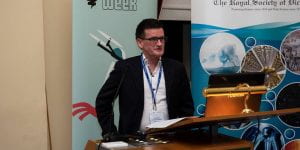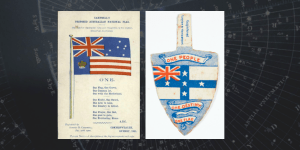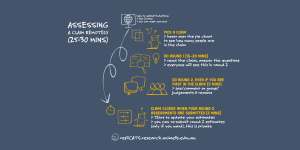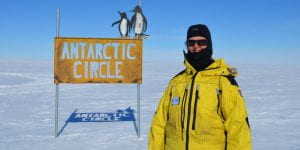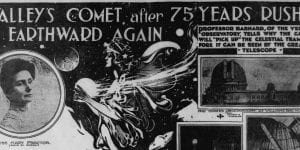Category: History & Philosophy of Science
-
Exploring the History of Antimatter
Kevin Orrman-Rossiter is an unusual PhD candidate. Having completed a PhD in Physics early in his career, he is now immersed in a second PhD in History and Philosophy of Science (HPS) looking at the history of antimatter focusing on the positron, the antiparticle of the electron. In conversation with Samara Greenwood, Kevin describes what […]blogs.unimelb.edu.au/shaps-research/2020/12/18/exploring-the-history-of-antimatter
-
On God and Science
For 20 years, Reverend Dr Stephen Ames has co-taught one of the most popular courses in the History and Philosophy Science program, God and the Natural Sciences (HPSC2002). In this subject, Stephen, who is both an Anglican Priest and HPS scholar, worked alongside atheist colleagues to show how religious and non-religious points of view can […]blogs.unimelb.edu.au/shaps-research/2020/10/19/on-god-and-science
-
Federation Stars: The Meanings of Popular Astronomy in Australia at the Turn of the Twentieth Century
In 1901 a new flag was chosen to represent a new nation, and the central emblem was a constellation of the southern sky. By this time, the symbolism of the Southern Cross had been entrenched; almost all previous Australian flag designs had included this device. The meanings of the Cross and the southern stars were, […] -
Reimagining Trust in Science
During National Science Week 2020 the History and Philosophy of Science program (HPS) hosted two events as part of the University of Melbourne’s Science Festival. The first event was a panel discussion on ‘Reimagining Trust in Science’, the second an interactive workshop showing how the repliCATS platform is being used to assess the reliability of […]blogs.unimelb.edu.au/shaps-research/2020/09/22/reimagining-trust-in-science
-
From HPS to Saving Planet A
Recently, HPS Alumna Dr Zoë Loh featured on the ABC documentary Fight for Planet A in relation to her role as a senior research scientist at CSIRO. In this interview, Zoë spoke with Samara Greenwood about her love for History and Philosophy of Science and how it has contributed not only to her career, but […]blogs.unimelb.edu.au/shaps-research/2020/09/01/from-hps-to-saving-planet-a
-
Are There ‘Male’ and ‘Female’ Brains?
How useful are the well-known and hotly contested categories of ‘male brain’ and ‘female brain’? Among experts, nobody really questions that anatomical sex differences in the brain exist. But since the advent of brain science, the scientific community has been divided over how many differences there are, which ones have been definitively proven, how large […]blogs.unimelb.edu.au/shaps-research/2020/08/10/are-there-male-and-female-brains
-
Remembering Ding Dyason: Bringing Humanities and Science Together
Last year marked one hundred years since the birth of Diana ‘Ding’ Dyason (1919–1989), historian of medicine and former head of History and Philosophy of Science (HPS). As one of HPS’s most inspiring and effective leaders, Ding Dyason was honoured with a series of events including the Ding Dyason Centenary HPS Seminar at the University […] -
Science Needs to Look Inward to Move Forward
Robust science depends on encouraging and incentivising more open and transparent practices in research – now, metascientists are looking at what works and what doesn’t.In a piece originally published in Pursuit, Andrew Trounson reports on this new discipline, including the contributions of Professor Fiona Fidler and Professor Simine Vazire from University of Melbourne. About a year […]blogs.unimelb.edu.au/shaps-research/2020/06/30/science-needs-to-look-inward-to-move-forward
-
Katherine Mannell
Katherine Mannell, ‘Young Adults, Mobile Messaging, and the Negotiation of (Un)Availability’ (PhD, History & Philosophy of Science, 2020) With a mobile phone, a person can reach and be reached anytime, anywhere. As many scholars have noted, this creates mutual expectations of availability, particularly among young adults whose friendships typically involve high rates of mobile messaging. […]blogs.unimelb.edu.au/shaps-research/2020/06/03/katherine-mannell
-
Mary Proctor: A Forgotten Populariser of Astronomy
In a recent History & Philosophy of Science seminar, SHAPS Research Fellow Dr Martin Bush presented his work on British-American populariser of astronomy, Mary Proctor, and her intriguing relationship to Australian history. From 1912–1914, Mary conducted a high-profile public lecture tour of Australia and New Zealand at the invitation of astronomer Walter Duffield. The purpose […]blogs.unimelb.edu.au/shaps-research/2020/06/03/mary-proctor-a-forgotten-populariser-of-astronomy
Number of posts found: 60
